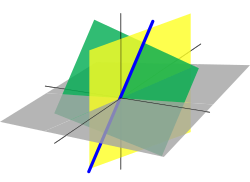Week 3 - Linear Algebra
Linear algebra is the framework or foundation for handling datasets and other forms of large amounts of data in most computer fields. This is because these languages of code have algorithms along with different inputs. rely on the principals that linear algebra is about or the theories it is responsible for. Systems like vectors, arrays, and regression are all good examples of how linear algebra has been intertwined into code and data handling situations. So with all of this, it's not important that you can use the formulas or algorithms and be able to solve them on paper. But it is important that you understand the fundamentals of tools, that you can manipulate them effectively, and that the code will solve the rest.
Linear Regression: A tool used to understand the relationship between variables. The common formula is y= A * b. Where y is your output and A is the dataset point and b is the datapoints coefficient.
Vectors: Is often pieces in an array. They are put into the array to the organize data. From here you can manipulate the array in many different ways through code/linear algebra.
This is important to business analytics because of its use of machine learning, data visualization, and handling of large amounts of data and sorting. This is because for tools such as regression analysis or if you are trying to predict the future of something based on points of data, linear algebra is used.
Last week, I talked about Python, the coding language. These linear algebras can all be done in Python, and as long as you understand the theories of the subject of math, you can use them to implement them in the coding language.
After Listening to the small audio file for this week I agree that its hard to separate the math that is used in coding and the math that is required for a computer science degree. Trying to make the math as real world as it gets is something that is hard in computer science. Because the math is so abstract and hard to follow. I think the reading from this week does a good job and giving you what you need to know to understand how this can relate to coding and not how this relates to math. This also makes getting into coding much less intimidating when looking at the math from this perspective and is much more interactive when learning the math through code.

Comments
Post a Comment